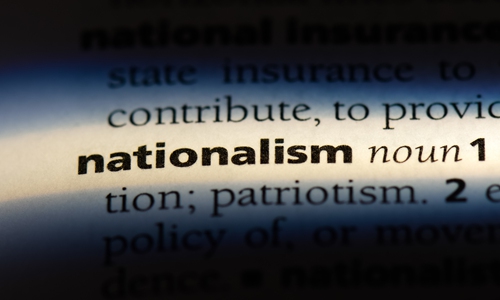HOME >> OPINION
Chinese Americans caught between ugly history and difficult times
By Rong Xiaoqing Source:Global Times Published: 2020/2/27 18:03:32

Photo: IC
Does my future lie in China or the US? This may read like a question many Chinese living in the US asking themselves. But it is in fact the topic of an essay contest held in 1936 that was hosted by a New York city club for Chinese women born in the US called Ching Hawk.
The winning entries were published in Chinese Digest, an English language publication in San Francisco. Charlotte Brooks, a professor of history at the City University of New York's (CUNY) Baruch College has been using the essays as teaching material in her Asian-American history class. Six years ago, inspired by a student's question, she decided to research the lives of second-generation Chinese Americans who were born in the US some 100 years. Her findings, captured in her recent book American Exodus: Second-Generation Chinese Americans in China, 1901-1949, are a surprise even to those with deep knowledge of the Chinese community.
It turns out from the 1900s to the 1940s, it became fashionable for American-born Chinese to move to their parents' home country to seek better opportunities. Their future in the US was largely regulated by the notorious Chinese Exclusion Act, which was in effect between 1882 to 1943. It banned Chinese laborers from immigrating to the US, even while white settlers were offered free land. The act imposed many restrictions on the rights of Chinese who were in the US, excluding them from many professions and even property ownership. In the 1910s alone, 5,000 American-born Chinese emigrated to China. By the 1940s, it's estimated that between a third to a half of the 35,000 or so second-generation Chinese-Americans had sailed to China.
At first, life in China was pretty smooth and comfortable as these "returnees" were able to mingle with people in high society, sent their children to the best schools, launched successful careers, benefitted from certain tax exemptions and other protections reserved only for foreigners.
Shanghai in the mid-1920s had more Chinese-American lawyers than New York, San Francisco and Honolulu combined. Those who were patriotic to China rolled up their sleeves to lead China's modernization, helping to build an air force and even calculating the electric power the Yellow River could generate.
But their rosy life began to fade by the late 1920s when nationalism began to surge.
This was further pumped up by Chiang Kai-shek's New Life Movement in the 1930s, which aimed to unite the nation and revamp its "morality" through civic education and Neo-Confucianism. Western products and lifestyle were targeted by the nationalists, and Chinese Americans - who were considered to be Western products themselves - lost the privileges they had enjoyed.
One of these Chinese-Americans was Louey Shuck, a California native who moved to Guangzhou after the 1911 revolution toppled the Qing Dynasty. He became a prominent merchant but his wife and a son were arrested in 1926 by Chiang's Nationalists who sought a large sum of money for property tax. Shuck had thought that as US citizens his family was exempt.
Then, there were the Goo sisters - Hawaiian born Edna and Evelyn Goo, who moved to Shanghai in 1933 and opened a profitable beauty salon there. The Goos specialized in giving women perms, which was later banned during the New Life Movement and the salon's business was hit hard. The Goos returned to Hawaii.
Disappointment in the corruption of the Nationalist Party and the start of the Japanese war in 1937, led to a big reversal in the flow of Chinese-Americans. The repeal of the Chinese Exclusion Act in the US in 1943 also contributed to the end of the exodus.
At a recent presentation by Brooks, at the Asian American/Asian Research Institute at CUNY, a young audience member asked her whether modern technology is helping today's Chinese Americans avoid picking sides by better connecting the US and China. The professor noted that Chinese Americans of a century ago didn't want to pick sides, but the war and nationalism forced their hand.
She said the Nationalists cast doubt on Chinese Americans "legitimate Chineseness because of their habits and their language." The US government did the same thing by casting doubt on their "Americaness," said Brooks.
Despite the ugly racism that has come to the fore in the US in recent years, and the friction between Washington and Beijing, Brooks says the US is now more tolerant of Chinese-Americans than it was at the turn of the previous century.
On that basis, Chinese here can probably - unlike their predecessors - still sit on the fence between the two cultures and the political pressures they face in both countries. But I worry this balance is becoming hard and harder to maintain.
The author is a New York-based journalist and an Alicia Patterson fellow. rong_xiaoqing@hotmail.com
Posted in: VIEWPOINT